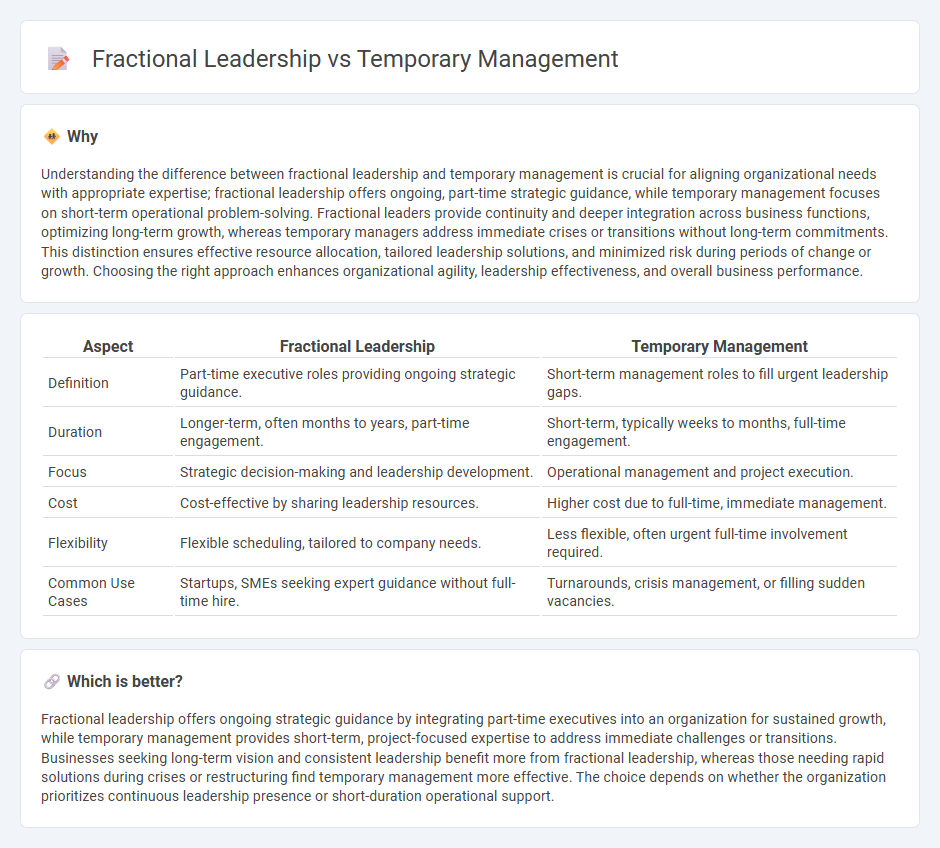
Fractional leadership offers strategic expertise on a part-time basis, enabling businesses to access experienced executives without full-time commitments. Temporary management fills immediate leadership gaps by deploying skilled managers for specific projects or transitional periods. Explore more to understand which approach best suits your organizational needs.
Why it is important
Understanding the difference between fractional leadership and temporary management is crucial for aligning organizational needs with appropriate expertise; fractional leadership offers ongoing, part-time strategic guidance, while temporary management focuses on short-term operational problem-solving. Fractional leaders provide continuity and deeper integration across business functions, optimizing long-term growth, whereas temporary managers address immediate crises or transitions without long-term commitments. This distinction ensures effective resource allocation, tailored leadership solutions, and minimized risk during periods of change or growth. Choosing the right approach enhances organizational agility, leadership effectiveness, and overall business performance.
Comparison Table
| Aspect | Fractional Leadership | Temporary Management |
|---|---|---|
| Definition | Part-time executive roles providing ongoing strategic guidance. | Short-term management roles to fill urgent leadership gaps. |
| Duration | Longer-term, often months to years, part-time engagement. | Short-term, typically weeks to months, full-time engagement. |
| Focus | Strategic decision-making and leadership development. | Operational management and project execution. |
| Cost | Cost-effective by sharing leadership resources. | Higher cost due to full-time, immediate management. |
| Flexibility | Flexible scheduling, tailored to company needs. | Less flexible, often urgent full-time involvement required. |
| Common Use Cases | Startups, SMEs seeking expert guidance without full-time hire. | Turnarounds, crisis management, or filling sudden vacancies. |
Which is better?
Fractional leadership offers ongoing strategic guidance by integrating part-time executives into an organization for sustained growth, while temporary management provides short-term, project-focused expertise to address immediate challenges or transitions. Businesses seeking long-term vision and consistent leadership benefit more from fractional leadership, whereas those needing rapid solutions during crises or restructuring find temporary management more effective. The choice depends on whether the organization prioritizes continuous leadership presence or short-duration operational support.
Connection
Fractional leadership and temporary management both involve providing experienced executives on a part-time or short-term basis to address specific organizational needs, enhance strategic decision-making, and drive change without the commitment of full-time hires. These approaches enable businesses to access high-level expertise, improve flexibility, and manage transitions or special projects efficiently. Shared goals include optimizing resources, accelerating growth, and ensuring leadership continuity during critical periods.
Key Terms
**Temporary Management:**
Temporary management involves appointing experienced professionals to lead organizations during transitional periods, such as mergers, restructuring, or crisis recovery, ensuring stability and continuity. These managers bring specialized skills for short-term assignments, often lasting from a few months to a year, filling critical leadership gaps without long-term commitments. Explore how temporary management can drive immediate impact and seamless change in your business by learning more about its strategic advantages.
Interim Management
Interim management involves appointing experienced professionals to fill temporary leadership gaps, ensuring continuity during transitions, crises, or organizational changes. This approach differs from fractional leadership, which provides part-time executives who manage ongoing strategic roles without full-time commitment. Explore the benefits and applications of interim management to understand how it can drive seamless operational success during critical periods.
Project-based Assignment
Project-based assignments benefit from temporary management by providing short-term expertise to address specific challenges and ensure project completion within tight deadlines. Fractional leadership offers ongoing strategic guidance, sharing an executive's time across multiple projects to maintain continuity and drive long-term growth. Explore deeper insights into how these leadership models optimize project outcomes effectively.
Source and External Links
Temporary Management of the Company - Offers temporary management services for key company positions, including crisis management and operational management during times of change.
Temporary Management - Provides highly qualified managers to lead departments or projects temporarily, often for business development or organizational transformation.
Interim Management - Involves temporary provision of management resources and skills to manage periods of transition, crisis, or change within an organization.
 dowidth.com
dowidth.com